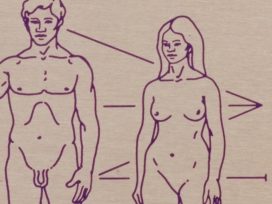“If God does not exist, everything is permitted.” Dostoevsky never actually wrote that line, though so often is it attributed to him that he may as well have. It has become the almost reflexive response of believers when faced with an argument for a godless world. Without religious faith, runs the argument, we cannot anchor our moral truths or truly know right from wrong. Without belief in God we will be lost in a miasma of moral nihilism. In recent years, the riposte of many to this challenge has been to argue that moral codes are not revealed by God but instantiated in nature, and in particular in the brain. Ethics is not a theological matter but a scientific one. Science is not simply a means of making sense of facts about the world, but also about values, because values are in essence facts in another form.
Few people have expressed this argument more forcefully than the neuroscientist Sam Harris. Over the past few years, through books such as The End of Faith and Letter to a Christian Nation, Harris has gained a considerable reputation as a no-holds-barred critic of religion, in particular of Islam, and as an acerbic champion of science. In his new book, The Moral Landscape: How Science Can Determine Human Values, he sets out to demolish the traditional philosophical distinction between is and ought, between the way the world is and the way that it should be, a distinction we most associate with David Hume.
What Hume failed to understand, Harris argues, is that science can bridge the gap between ought and is, by turning moral claims into empirical facts. Values, he argues, are facts about the “states of the world” and “states of the human brain”. We need to think of morality, therefore, as “an undeveloped branch of science”: “Questions about values are really questions about the wellbeing of conscious creatures. Values, therefore, translate into facts that can be scientifically understood: regarding positive and negative social emotions, the effects of specific laws on human relationships, the neurophysiology of happiness and suffering, etc.” Science, and neuroscience in particular, does not simply explain why we might respond in particular ways to equality or to torture but also whether equality is a good, and torture morally acceptable. Where there are disagreements over moral questions, Harris believes, science will decide which view is right “because the discrepant answers people give to them translate into differences in our brains, in the brains of others and in the world at large.”
Harris is nothing if not self-confident. There is a voluminous philosophical literature that stretches back almost to the origins of the discipline on the relationship between facts and values. Harris chooses to ignore most of it. He does not wish to engage “more directly with the academic literature on moral philosophy”, he explains in a footnote, because he did not develop his arguments “by reading the work of moral philosophers” and because he is “convinced that every appearance of terms like ‘metaethics’, ‘deontology’, ‘noncognitivism’, ‘antirealism’, ’emotivism’, etc directly increases the amount of boredom in the universe.”
Imagine a sociologist who wrote about evolutionary theory without discussing the work of Darwin, Fisher, Mayr, Hamilton, Trivers or Dawkins on the grounds that he did not come to his conclusions by reading about biology and because discussing concepts such as “adaptation”, “speciation”, “homology”, “phylogenetics” or “kin selection” would “increase the amount of boredom in the universe”. How seriously would we, and should we, take his argument? It is one thing to want to “start a conversation that a wider audience can engage with and can find helpful”, something that many of us, including many of those boring moral philosophers, seek to do. It is quite another to imagine that you can engage in any kind of conversation, with any kind of audience, by wilfully ignoring the relevant scholarship because it is “boring”.
How does Harris establish that values are facts? There are, he says, certain kinds of lives that most would agree are bad, and certain kinds of lives that most would agree are good. Imagine a young widow whose seven-year-old daughter was “raped and dismembered” in front of her by her own 14-year-old son “goaded to this evil at the point of a machete by a press gang of drug-addled soldiers”. It was an act “not entirely out of character with the other days of [a] life” that from the moment of birth has been “a theatre of cruelty and violence”. Most people would accept that this woman was living what Harris calls “a Bad Life”. Now imagine a woman who is “married to the most loving, intelligent and charismatic person”, who has a career that is “intellectually stimulating and financially rewarding”, who is able to devote herself “to activities that bring [her] immense personal satisfaction” and who has “just won a billion-dollar grant to benefit children in the developing world”. Not many people, I would imagine, would disagree with Harris that this woman is living “a Good Life”. “Once we agree that the extremes of absolute misery and absolute flourishing – whatever those states amount to for each particular being in the end – are different and dependant upon facts about the universe,” Harris argues, “then we have admitted that there are right and wrong answers to the question of morality.” Good circumstances give rise to good lives, bad circumstances to bad lives. It is objectively good to value a good life and objectively bad to value a bad life.
Therefore there are objectively good values and objectively bad values and values are facts about the world. It is a kind of argument that suggests that Harris might have done well to spend a bit more time immersed in all the boring stuff. To accept that murder and rape are bad is to accept that one is not a psychopath. But being able to distinguish between psychopaths and non-psychopaths is not the same as establishing the ontological status of non-psychopathic values. Or, to put it another way, even most moral relativists abhor murder and rape and few carry a torch for either Hitler or the Taliban. The insistence that because it seems obvious that rape and murder are bad, and that wealth and security are good, so there must be objective values seems about as plausible as the argument that because there are gaps in the fossil record, so God must have created Adam and Eve.
Having established the objectivity of values, Harris then insists that morality “really relates to the intentions and behaviours that affect the wellbeing of conscious creatures” and so can “translate into facts that can be scientifically understood”. But why should morality self-evidently relate solely to the “wellbeing of conscious creatures”? Why not, as some insist, to the wellbeing of the planet? Or of ecosystems? Or, as others argue, to the wellbeing of humans, as autonomous moral agents, rather than to that of all conscious creatures? I can think of rational arguments that can help distinguish between these claims. But I can think of no empirical test that can do so. Nor does Harris suggest any. And if there is no such test, it is difficult to know how it is a fact that can be scientifically understood. Let us grant that morality does relate solely to the wellbeing of conscious creatures. What scientific test can be used to define wellbeing? Harris accepts that wellbeing is a fuzzy concept. But so, he points out, are many scientific categories. We cannot define with absolute accuracy what it means to be healthy but most people would know the objective difference between a healthy person and an unhealthy one.
This, however, is to misunderstand the problem. The issue is not so much that wellbeing is a fuzzy category as that it can, in specific cases, be well-defined but in a number of different ways that are often conflicting in a manner that science cannot resolve. Perhaps the best way to understand this is to explore Harris’ own moral values, particularly in relation to Islam. “There is,” Harris observes, “absolutely no reason to think that demonising homosexuals, stoning adulterers, veiling women, soliciting the murder of artists and intellectuals and celebrating the exploits of suicide bombers will move humanity towards a peak on the moral landscape.” I agree. But why does Harris seem to believe that demonising Muslims will help move humanity to a peak on the moral landscape? What is moral about insisting, as Harris does in his book The End of Faith, that a “good Muslim” (“good” in the sense of being religiously faithful) who possesses “military and economic power” poses “an unconscionable threat to the civil society of others”?
Or in claiming, as he did in a Los Angeles Times column, that “the people who speak most sensibly about the threat that Islam poses to Europe are actually fascists”? I agree with Harris that “killing cartoonists for blasphemy does not lead anywhere worth going on the landscape”. But I cannot see how suggesting, as Harris does in The End of Faith, that “some propositions are so dangerous that it may even be ethical to kill people for believing them” does so either. Nor claiming, as Harris did in the Huffington Post, that “torture may be an ethical necessity in our war on terror”. Harris has what he considers to be rational defences against such criticisms. Since we are happy to accept “collateral damage” in the war on terror, actions in which innocent non-combatants may be maimed or killed, why, he asks, should we cavil at torturing suspected terrorists? And what, he wonders, is wrong with killing an individual whose beliefs could inspire others to commit great violence? It would, he suggests, be an act of “self-defence”.
I disagree with Harris’s rationalisations, not because I am a “self-hating moral relativist”, as Harris insists on dubbing most of his critics, but because I have a fundamentally different view of what constitutes the good. The difference between torture and collateral damage, for instance, is the difference between deliberately treating a human being as a piece of meat and unintentionally killing some people. For a consequentialist like Harris the distinction between means and ends revealed in that difference may not be important. For those not entirely trapped within a consequentialist view of morality, it is. Consequences clearly matter. But there is more to morality than poring over a spreadsheet of outcomes. All moral codes have, of course, a certain in-built flexibility. Most people would accept that murder is a moral wrong. But if a woman in a violent and abusive relationship murders her husband, most would understand her actions, perhaps even accept them as having been necessary, while still deeming murder, and maybe even her specific response, to be morally unacceptable. This can be as true of torture as of murder.
Even though I reject the comparison between torture and collateral damage, and even though I regard torture as treating a human being as a piece of meat, I also accept that there may be circumstances – the famous “ticking bomb” scenario, for instance – in which I would understand why an individual had been treated as a piece of meat. This does not make torture ethically right, or collapses the moral chasm between torture and collateral damage. Rather it reveals the distinction between ethical norms and pragmatic needs. Those who murder and torture should always have to answer, morally and legally, for their actions. How we judge those actions depends, however, upon the context – the particular circumstances, the intentions of the perpetrator, and so on. Such judgment is as much a matter of wisdom – admittedly, an unfashionable word these days – as of science.
If Sam Harris and I were to debate these issues, each of us would insist that he was right and the other wrong. Both would draw upon facts about the world, root those facts within our particular political and moral framework, and use reason to bind the argument together. Neither would accept that our moral stance was valid only for a specific culture but would maintain its universal validity. It would not, however, be a “scientific” debate. The difference between a consequentialist and a non-consequentialist view of torture, for instance, cannot be resolved empirically. It rests upon whether or not one accepts that counting consequences is a useful way of thinking about torture. A debate between Harris and me would be very different to either of us debating, say, a defender of intelligent design or someone who rejects anthropogenic climate change.
What would be the effect of Harris insisting that that his view was scientific and mine not so? It would not make his argument scientific. It may, however, give his argument the authority of science, which is something very different. And therein lies the danger. Science has great authority in the modern world, and rightly so. But if it is important to defend the authority of science in matters of fact, it is equally important to reject attempts to make use of such authority in arenas in which more is at play than simply facts. There is, of course, a long history of the use of science as a mask for prejudice.
There is a deeper problem, too, in Harris’s argument. His is an aristocratic view of morality. Moral norms seem not to emerge through a process of social engagement and collective conversation, nor in the course of self-improvement, but rather are laws to be revealed from on high and imposed upon those below. Science will tell us which conception of the good life is objectively true, and ensure that we all keep to the moral straight and narrow. Harris looks forward, for instance, to the day that governments and corporations will be able to use brain scanning technology to detect whether people are lying, thereby creating “zones of obligatory candour” and enabling an entirely truthful public life. “Thereafter, civilised men and women might share a common presumption,” he writes, “that whenever important conversations are held, the truthfulness of all participants will be monitored.” This would no more be a deprivation of freedom than currently it is to be denied “the right to remove our pants in the supermarket”.
It is an argument that reveals once again the difficulties of the claim that science can umpire moral disagreements. The question of whether the creation of “zones of obligatory candour” would be a rational enterprise or a totalitarian nightmare, of whether enforced truthfulness is a moral good or a denial of individual autonomy, cannot be determined scientifically but expresses, rather, a philosophical and political distinction. Harris dismisses the criticism that using compulsory brain scans in the courtroom would be an infringement of the US Fifth Amendment, which protects an individual against self-incrimination. “Prohibition against compelled testimony,” he writes, “appears to be a relic of a more superstitious age” in which it was “believed that lying under oath would damn a person’s soul for eternity.” This is an odd view of moral and political history. Protection against compelled testimony is, in fact, an Enlightenment concept, a product of the liberal defence of individual autonomy against the power of the state. Harris’s insistence on enforced truthfulness is, on the other hand, far closer to the pre-modern and religious belief that authority should take precedence over individual freedom.
The desire to root morality in science derives from a laudable aspiration to demonstrate the redundancy of religion to ethical thinking. The irony is that the classic argument against looking to God as the source of moral values – Plato’s Euthyphro dilemma – is equally applicable to the claim that science is, or should be, the arbiter of good and evil. In his dialogue Euthyphro, Plato has Socrates ask the famous question: do the gods love the good because it is good, or is it good because it is loved by the gods? If the good is good simply because the gods choose it, then the notion of the good becomes arbitrary. If on the other hand, the gods choose the good because it is good, then the good is independent of the gods.
The same dilemma faces contemporary defenders of the claim that science determines moral values. Harris argues that wellbeing can be defined through data gained from fMRI scans, physiological observation, pharmacological measures, etc. Such studies may be able to tell us which brain states, neurotransmitters or hormones calibrate with particular real-world conditions. But whether those states, neurotransmitters or hormones are seen as indicators of wellbeing depends on whether we consider those real-life conditions as expressions of wellbeing. If wellbeing is defined simply by the existence of certain neural states, or by the presence of particular hormones or neurotransmitters, or because of certain evolutionary dispositions, then the notion of wellbeing is arbitrary. If such a definition is not to be arbitrary, then it can only be because the neural state, or the hormonal or neurotransmitter level, or the evolutionary disposition, correlates with a notion of wellbeing or of the good, which has been arrived at independently.
Science (or rather scientists) may be able to develop machines that can predict whether an individual is lying or not. But it cannot tell us whether it is a good that all our thoughts be monitored. That is a moral, not a scientific, judgment. The desire to look either to God or to science to define moral values is a desire to set moral values in ethical concrete. It is a yearning for moral certainty, a fear that without external authority, humans will fall into the morass of moral relativism. But just as we do not need the false certainty of a divinely sanctified moral code, neither do we need the false certainty of a morality rooted in science.
There is an important truth to Harris’s argument that facts and values are not as distinct as many now suggest. Unless we wish to believe that values are simply plucked out of the sky, then we must accept that there is some relationship between the kinds of values that we hold, the kinds of beings that we are, and the kind of world in which we live. But while values can never be entirely wrenched apart from facts, neither can they be collapsed into facts. Humans are the bridge between facts and values. The significance of the Euthyphro dilemma is that it embodies a deeper claim: that concepts such as goodness, happiness and wellbeing only have meaning in a world in which conscious, rational, moral agents exist that themselves are capable of defining moral right and wrong and acting upon it. It is the existence of humans as autonomous moral agents that allows us to act as the bridge between facts and values.
Or, to put it another way, it is the fact of our existence as moral beings that ensures both that facts and values are linked but also that they are distinct. Creating a distinction between facts and values is neither to denigrate science nor to downgrade the importance of empirical evidence. It is, rather, to take both science and evidence seriously. It is precisely out of the facts of the world, and those of human existence, that the distinction between is and ought arises, as does the necessity for humans to take responsibility for moral judgement.






